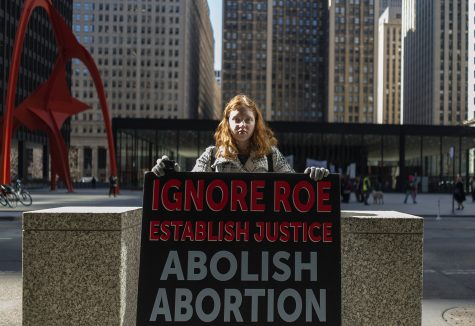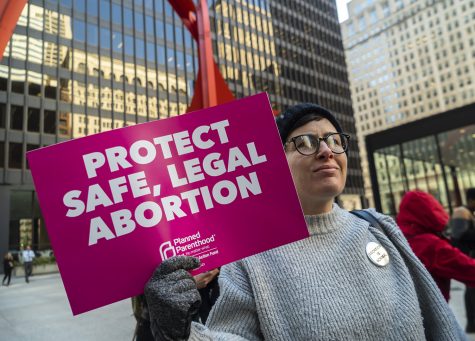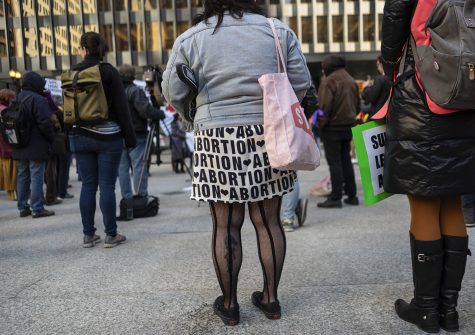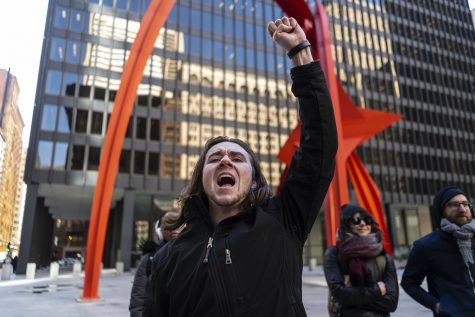Abortion rights advocates rally in Chicago ahead of Supreme Court case

Moriah Stefanski, 19, an anti-abortion activist, protests across the street from the Planned Parenthood Illinois Action Rally on Wednesday.
Michael C. Oboza was 14 years old when he witnessed his friend bleed to death giving herself an abortion with a coat hanger.
“A woman [can] decide with her own body if she would like an abortion, and if she cannot afford one, she has a right to have a free abortion,” said Oboza as he held a sign that read “Free abortion
on demand.”
Now 44, Oboza attended a rally organized by Planned Parenthood Illinois Action, or PPIA, outside Federal Center Plaza, 219 S. Dearborn St., on Wednesday, March 4, in honor of his friend who did not have access to a safe and affordable abortion.
Oboza was one of nearly 50 people who attended the rally as the Supreme Court started arguments that same day in June Medical Services v. Russo, the first abortion case to reach the Supreme Court in 30 years.
The case, which originated in Louisiana, is the first abortion-related case since Justices Neil Gorsuch and Brett Kavanaugh—both appointed by President Donald Trump—were sworn onto the bench.

Amanda Batsleer, 43, attends a rally held by Planned Parenthood Illinois Action at Federal Plaza.
If the Supreme Court decides to uphold Louisiana’s law, getting an abortion will be more difficult because physicians would be required to have admitting privileges at local hospitals to legally perform an abortion, though those privileges can be denied.
For doctors, operating without admitting privileges could lead to them being fined or imprisoned, and clinics may also face fines or have their licenses revoked.
This decision could initiate a domino effect impacting other abortion clinics in the U.S. if the Court does not decide in June Medical Services’ favor.
The Supreme Court is expected to come to a decision in late June.
Paula Thornton Greear, vice president of external affairs for PPIA, said the current case is another “unconstitutional overreach” that goes against the current rulings of Roe v. Wade.
Thornton Greear said it is not enough to keep abortion legal and said legislation needs to go further by keeping abortion affordable for all marginalized communities.
“The reality is that structural racial injustice, transgender inequality, gender discrimination and many other forms of oppression are painfully intertwined with the process by which fundamental rights are afforded in this country,” Thorton Greear said.
A group of counter-protesters was also present at the rally.

A protester wears an “abortion skirt” during the press conference of PPIA rally at the Federal Center Plaza on Wednesday.
Mario Navarro, an anti-abortion activist and director of Operation Save Chicago, said it is increasingly difficult to be an anti-abortion activist in Chicago because violence has broken out against his group before.
Navarro said Operation Save Chicago is different than other anti-abortion organizations because they are not trying to “push an agenda,” rather they want to “liberate a human” from death.
“We believe each child is made in the image of God,” he said. “Therefore [they] must be protected from conception to natural death.”
Despite abortion rights advocates at the rally telling Moriah Stefanski, 19, assistant director of operations for Operation Save Chicago, that she is too young to be involved with the group and will change her mind when she is older, she said God’s word to her is “very clear.”

Abortion rights advocate Billie Kincaid, 29, chants during the Planned Parenthood Illinois Action rally at Federal Plaza, Wednesday, March 4.
“Abortion is not a human right because nobody has the right to murder another human being,” she said.
Members of Mujeres Latinas en Accion, a bilingual organization based in Pilsen that provides a safe space to talk about women’s reproductive health, stood in a semi-circle with PPIA protesters, holding signs that read “If my uterus had a gun, would I have more rights?” and “Abortion is a right—no going back.”
Jocelyn Moreno, a 2018 Columbia graphic design alumna, attended the rally with Mujeres Latinas en Accion.
“There’s a lot of fear obviously right now with our political climate … so people don’t really know … what they have access to [and] what their rights are,” she said. “My job is to come in and make sure we are speaking about these things and we provide our community with the best resources and the best information.”

